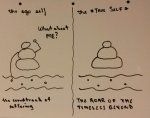Clarity,
Office 17622,
PO Box 6945,
London.
W1A 6US
United Kingdom
Phone/ Voicemail:
+44 (0)20 3287 3053 (UK)
+1 (561) 459-4758 (US).

I find myself asking, what do you mean by this? The word itself simply means 'action' but when people talk about 'karma' they often mean the concept or 'law' of karma, where the intentions of our actions have future consequences. Is this what you mean?Is karma real?
Which is exactly how I have always interpreted karma! You do good, you get good, you do bad, you get bad. Maybe not in this life, but in the next one for sure16.4 doesn’t necessarily mean attracting what is positive but rather “like attracts like.”
Hmm, You may be right .... and I will ponder this as I finish my illusionary breakfast and sip my equally illusionary coffee. Ah, much better, so now ....I think of it as our physical bodies are an illusion ....
I don't really know if 'karma' exisits, but I try to live my life with some sense of honesty and non-harming, because - if for nothing else - it was how I was raised, and it's probably best to hedge my bets just in case it is true!I lean toward the common known about it: that ... his deeds, good or bad, will be responded ie doing a living being harm will return with harm upon oneself and vice versa.
It's an easy mistake to make, given that if you search for it, most of the videos that come up indicate it's a Bob Marley song (note however, that all of these vidoes only have his picture and none of them actually show him performing the song) ... and this leads to my second law of Karma:Bob Marley did not write and never recorded 'Don't Worry, Be Happy'. ..........." Thank You for information.
And closely related, not every I Ching book we find or read is going to be accurate - or speak to us or be useful to us.Where A. Huang got Delight, K. & R. Huang got Weariness.
So. is this what you think - that we're better off not looking at the Hexagram names? Or are you just posing this as a question? That is not clear to me? (And I believe this question deserves it's own thread in Exploring Divination, which I think I'll start soon.)The only author I know who (hasn't) translated the chinese (pinyin-) tags into english (is) James Legge .... Whether he then avoided that because he knew what a confusion it would (later) entail ??? - probably not ....
.... but referring to the list you gave from Hatcher's site, we would maybe be better served without the english translations of these tags.
Yes, that is quite true, and it may lead to confusion, but then again, how people translate the actual text in so many different ways can also be confusing - regardless if they include the hexgram names or not! I'm not sure how to resolve that.... on the other hand, as not being a scholar/sinologist, people like me, newbees/amateurs are dependent on the translations that have been offered.
And it's a good way for us to learn it too!... but on the other hand: it's a good way to learn your language
Hmm, or is it that your faith doesn't allow you to understand or consider that Karma might exist (a.k.a. 'blind faith')? And does your faith (... not mine or anyone elses') also refute what the I Ching is saying?Our faith refutes the existence of karma, this is fiction!
Our faith refutes the existence of karma, this is fiction!
Actually, he did not tell us what 'our faith' was or is! So, is that the royal we? As in 'our faith is not amused!'He didn't even bother to state what his faith was.

"Is Karma Real?” 16.4 to 2 ~ Where there is selfishness, Yes.
Karma is translated as selfish ‘actions’ of body, speech and thought which bigfoot (thunder) the cosmic action of Mother Nature (earth).
is fairly in accordance.I suppose it is saying yes, as this is a line that speeks explicitly about attracting. So at least it is saying that you attract what is positive, from how I read it.
Clarity,
Office 17622,
PO Box 6945,
London.
W1A 6US
United Kingdom
Phone/ Voicemail:
+44 (0)20 3287 3053 (UK)
+1 (561) 459-4758 (US).